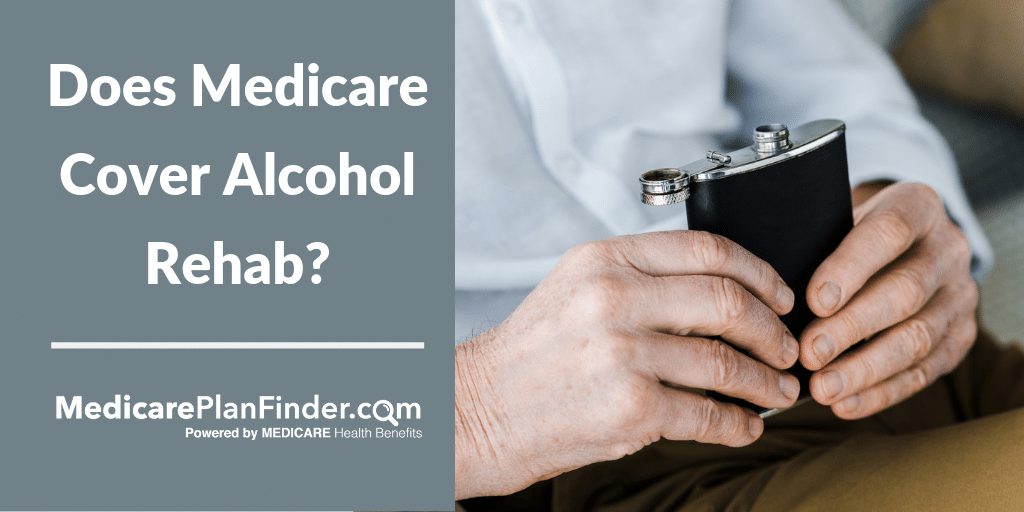
Does Medicare Cover Alcohol Rehab and Substance Abuse?
March 6, 2020Substance abuse costs the US more than $740 billion every year. Those costs are related to crime, healthcare, and lost productivity at work.
Overcoming addiction is a lot of work, and it takes a team of mental health and medical professionals to keep you on the right path. You might know that Medicare will pay for doctor visits for illness and injuries, but what you want to know is, “Does Medicare cover alcohol rehab?”
Medicare does cover many of the costs related to alcohol rehab and treatment if your provider says those services are medically necessary. You must get treatment at a Medicare-approved facility or from a Medicare-approved provider, and that provider must create a care plan.
Addiction Treatment for Seniors and Medicare Eligibles

Treatment for addiction is a lot like treatment for any other disease. It starts small, often with preventive measures, and will progress according to the doctor’s recommendations.
Medicare pays for alcohol and substance abuse treatment for both inpatients and outpatients. Substance use disorders are drug addictions that influence a person’s thoughts, feelings, and behaviors.
These disorders aren’t just limited to illicit drugs, such as Cocaine, Ecstasy, GHB, Hallucinogens, and Heroin, among others. They can also include misuse of legal drugs like nicotine, marijuana, or alcohol as well as legal medications like fentanyl (Duragesic), hydrocodone (Vicodin), or oxycodone (OxyContin).
The American Society of Addiction Medicine (ASAM) divides treatment into five levels of care. Here’s how they relate to Medicare:
Level 0.5, Early Intervention
Education and prevention for people who are at risk of developing an addiction fall under this level. Medicare can cover a conversation with your doctor about a prescription drug that may be habit-forming.
Level 1, Outpatient Treatment
This level of addiction treatment refers to nine hours or less of weekly counseling services or recovery. Outpatient mental health services fall under Medicare Part B and certain Medicare Advantage (MA or Part C) plans.
Level 2, Intensive Outpatient and Partial Hospitalization
These treatment programs are categorized as having more than nine hours of counseling services a week, and/or short inpatient hospital care. Medicare Part A pays for hospital stays of up to 60 days. After 60 days, you will owe coinsurance.
According to the American Addiction Centers, “Part B covers partial hospitalization (PHP), which is an outpatient treatment” that a hospital or mental health center provides. A PHP provides more intensive treatment than standard outpatient programs.
A doctor must say that PHP is medically necessary, and your treatment plan must include at least 20 hours of treatment per week.
PHP services can include:
- Individual and group therapy
- Occupational therapy
- Family therapy
- Patient education
- Activity therapies that are not chiefly recreational
- Therapeutic drugs that can’t be self-administered
- Medically necessary diagnostic services for mental health
Level 3, Inpatient Treatment
The next level involves up to 90 days in a rehab facility with a focus on behavioral therapy and staying away from substances. Medicare Part A covers the first 60 days of psychiatric hospital stays.
Days 61-90 will cost most people $335/day.
According to the American Addiction Centers, you can receive up to 190 days of treatment at a specialty psychiatric hospital, but no more. That is a lifetime limit. You may be able to receive treatment under Medicare Part A at:
- Acute care hospitals
- Critical access hospitals
- Inpatient rehab centers
- Long-term care hospitals
- Inpatient care as part of a qualifying research study
- Mental health care
Level 4, Medically-Managed Intensive Inpatient Services
People whose long-term addictions have caused them physical harm need this level of care. It not only involves drug and alcohol counseling but also access to nursing care, prescription drugs, and other medical services
Medicare Part A covers limited home health care, and Medicare Part D and certain Medicare Advantage (Part C) plans cover prescription drugs.
Medicare Coverage and Overdoses
In the event that you or someone you love suffers an overdose, Medicare covers some treatments. For example, most Medicare Part D plans cover Narcan, the drug used to reverse the effects of an opioid overdose.
Typical co-pays for most people with Part D and certain Part C plans for Narcan range from $19-$144.
Medicare Part A is hospital insurance, and it will cover your hospital stay, but not all services fall under Part A. Ambulance transportation is under Part B, and so is doctor observation until you are “officially admitted” into the hospital.
The Centers for Medicare & Medicaid Services (CMS) cover mental health treatment. Medicaid is a federal and state program to help you with your medical costs if you have limited income.
Mental health treatment services are based on screening, brief intervention, and referral to treatment (SBIRT). This is an evidence-based approach used in public health for early interventions and treatment services.
It’s designed to help someone at risk for a substance abuse disorder or who already has a substance abuse disorder.
For instance, after this comprehensive evaluation protocol, someone addicted to heroin might be administered methadone to reduce the intensity of withdrawal symptoms. If this patient does not benefit from outpatient treatment, then inpatient psychiatric care is another option. Such residential treatments provide a space for treatment, sleeping, bathing, recreation, and dining.
Addiction is a disease, and with the right treatment plan, it can be managed. A qualified professional can guide you through the thousands of Medicare plans out there and help you find one that will suit your needs.
Does Medicare Cover Opioid Treatment?
In 2025, the Medicare program includes paying for Opioid Treatment Programs (OTP). The Medicare-enrolled opioid treatment program is comprehensive, consisting of periodic assessments, intake procedures, toxicology testing, individual therapy, group therapy, and counseling for substance use.
It also includes FDA approved opioid treatments and medication-assisted treatment (MAT) medications as well as the dispensation and management of MAT medications. A search for “opioid treatment programs near me” will show you a map of addiction treatment centers in your neighborhood.
SAMHSA Helpline to Find Treatment
The Substance Abuse and Mental Health Services Administration (SAMHSA) National Helpline is a free, confidential service you can use 24 hours a day, seven days a week to find treatment for substance abuse disorders. You reach the helpline at 1-800-662-HELP (4357) or use SAMHSA’s online treatment finder tools.
What Is the SAMHSA Helpline?
The SAMHSA National Helpline offers assistance in finding local treatment facilities, support groups, and community-based organizations. You can also request free publications and other information.
Will My Medicare Plan Cover This Service?
The referral service is free. When you call, ask the representative to refer you to a facility that accepts Medicare. If you have a Medicare Advantage plan, ask your health insurance carrier for a list of participating healthcare providers.
How to Find Approved Medicare Alcohol Treatment and Drug Rehab Providers
Medicare’s Physician Compare website is a great resource for finding addiction treatment in your area. Click here to get started.
You’ll reach a page that allows you to enter your zip code and what type of medical practice you want to find. We chose 37209, which is the zip code for our corporate offices in Nashville, TN.
For the practice type, we chose “addiction medicine.” Once you’ve entered that information, click “search.”
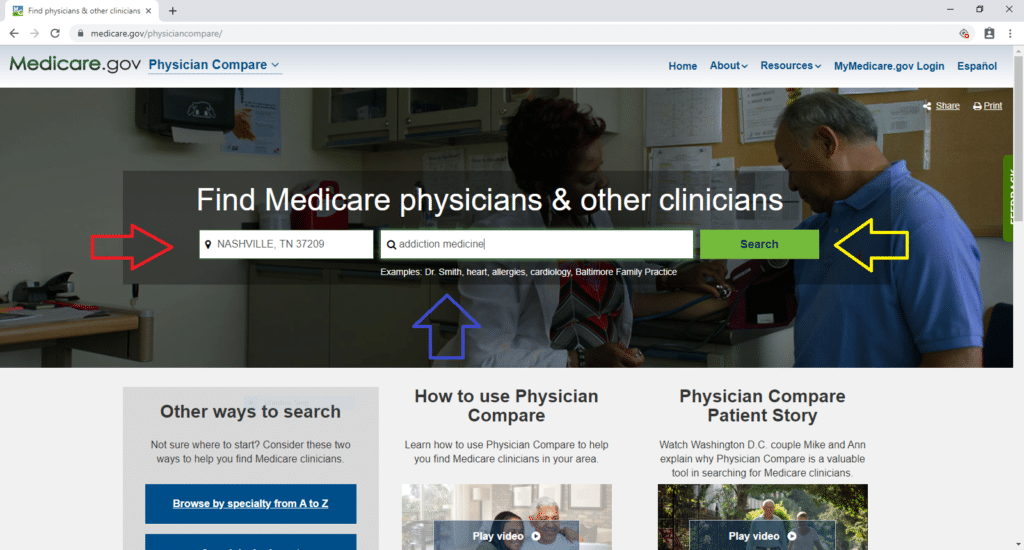
That will lead you to a list of local practices that specialize in addiction treatment. You can use the contact information to call the facilities and compare their services, or you can use Medicare.gov’s tool.
To use the tool, click on the practices you want to compare. For our purposes, we only chose the top three practices on the list.
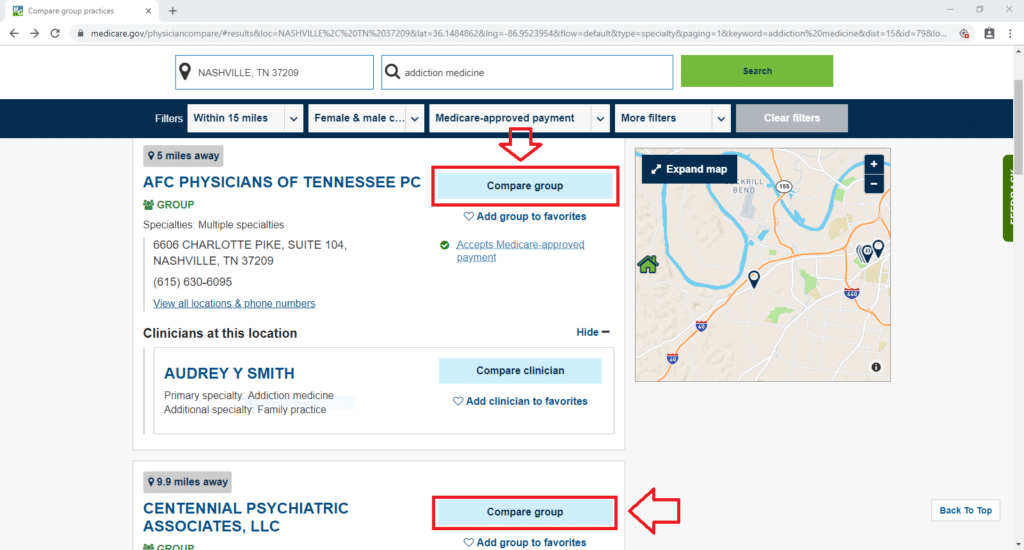
Then click “Compare” at the bottom of the page.
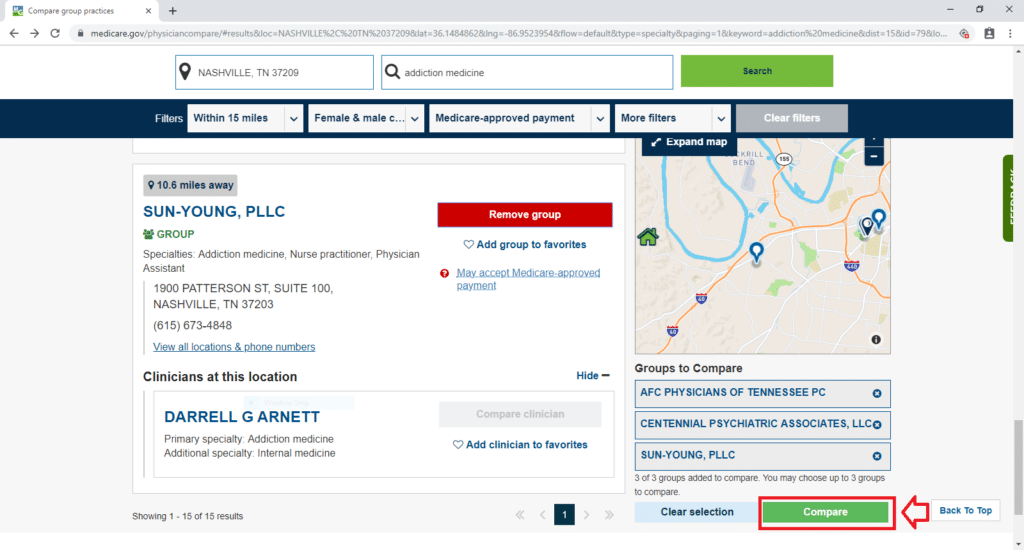
Then you will come to a page that allows you to view practice contact information on one screen. You can also look at the practices’ full profiles and get directions to each location.
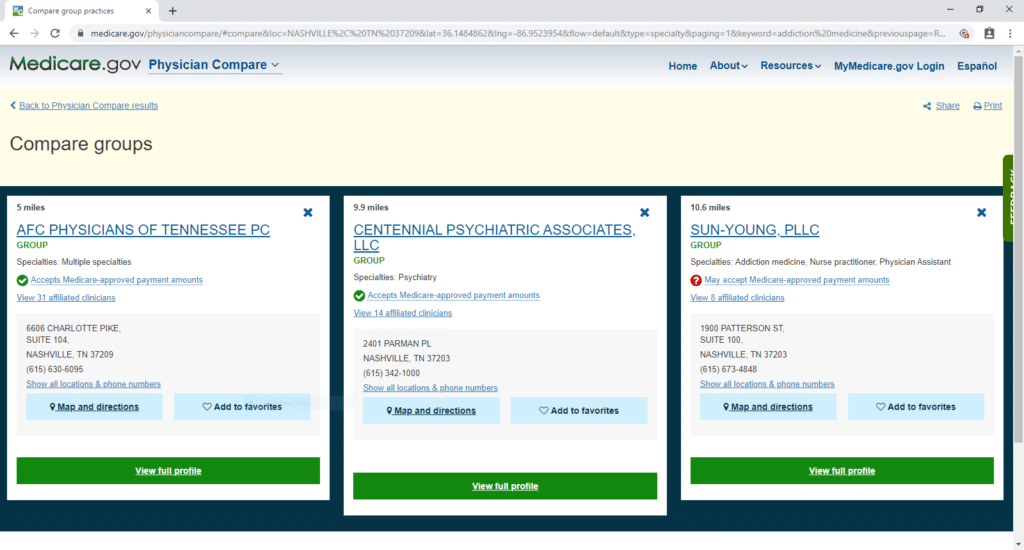
Prevalence of Substance Abuse in Older Adults
Older adults (defined as 65 and older in the United States) most commonly abuse alcohol, but many also abuse prescription and illegal drugs. The percentage of older adults who met the criteria for having an addiction problem was 11.7 percent.
Drug abuse in adults older than 65 years is mainly limited to alcohol despite the prevalence of so many illicit drugs and mood-altering prescription drugs.
Substance Abuse in the Elderly: Unique Issues and Concerns
The elderly population accounts for 25% of the prescription drugs sold in the US, and this population faces unique issues when it comes to substance abuse. Because addiction symptoms look like other common senior health disorders such as dementia, diabetes, and depression, addiction often goes ignored.
According to the National Institute on Alcohol Abuse and Alcoholism (NIAAA), drug addiction in adults over 60 years primarily arises from alcohol and prescription drugs. This creates a risk of harmful interactions between the two.
Medicare Help for You or Someone You Love
If you or someone you love struggles with drug or alcohol addiction, you don’t have to face it alone. A licensed agent with Medicare Plan Finder may be able to help you find a Medicare plan with the right care team to lead your or your loved one’s recovery.
To set up a no-cost, no-obligation appointment with an agent call (833)-567-3163 or contact us here today.

This post was originally published on April 22, 2019, and updated on January 15, 2025.

